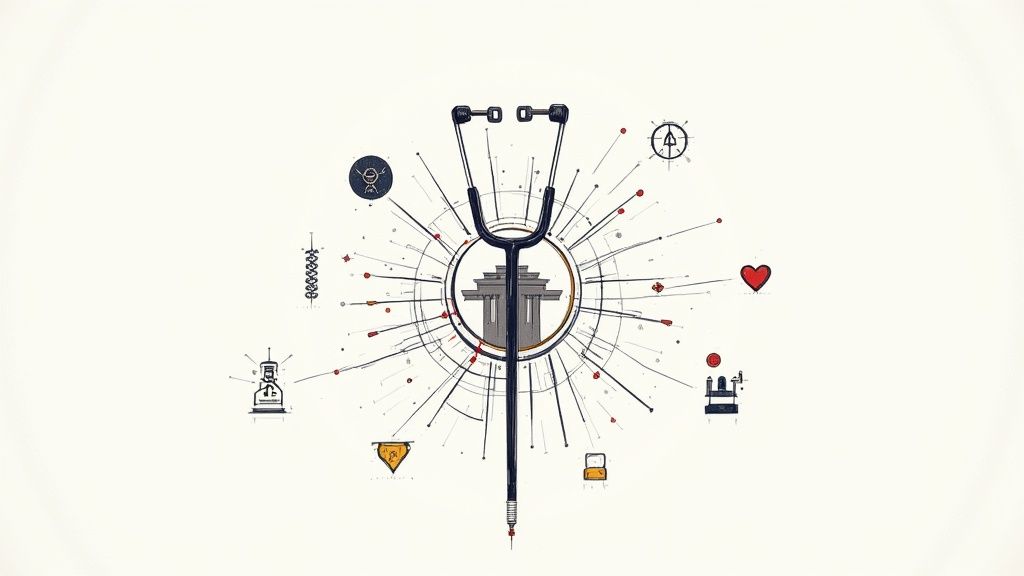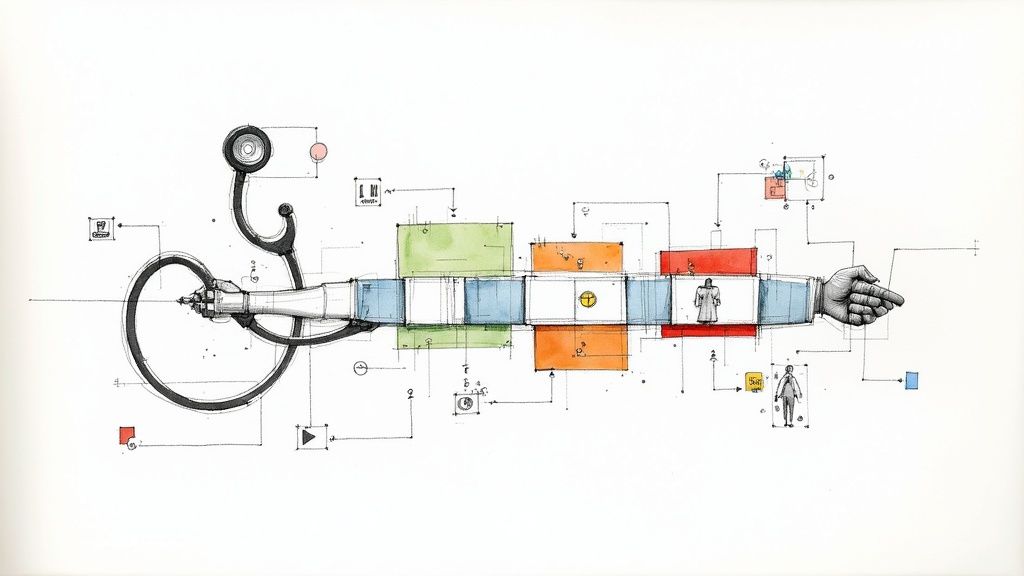Top AI Companies Healthcare Leaders Should Know
Discover the top AI companies healthcare providers are partnering with. Learn how they are revolutionizing diagnostics, drug discovery, and patient care.
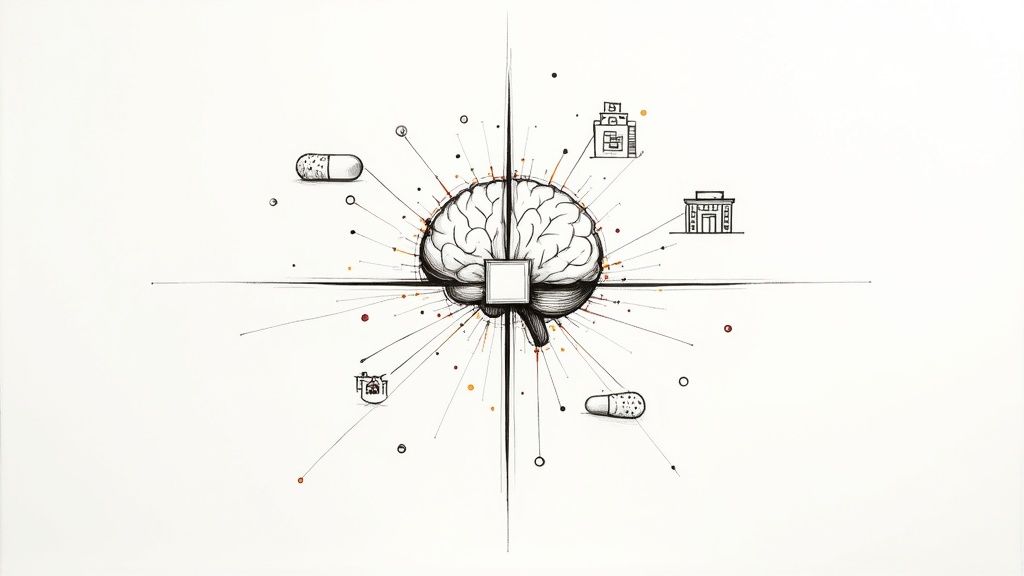
You'll find some of the most impressive AI companies in healthcare are specialists. Think of diagnostics leaders like PathAI, drug discovery pioneers such as Atomwise, and operational experts like the former company Olive. These aren't just tech companies; they're fundamentally changing how we deliver patient care by speeding up research, sharpening accuracy, and untangling administrative knots.
The New Era of AI in Patient Care
Healthcare is undergoing a massive shift, and artificial intelligence is right at the center of it. For anyone in a healthcare leadership position, just knowing the buzzwords isn't enough anymore. You have to understand who the key players are. AI has moved beyond theory and is now a practical tool for improving patient outcomes, making hospitals run smoother, and pushing medical research forward at an incredible pace.
The numbers alone tell a compelling story. The global AI in healthcare market was valued at USD 26.69 billion recently and is on a trajectory to hit an estimated USD 613.81 billion by 2034. That's a compound annual growth rate (CAGR) of 36.83%. In the U.S. alone, the market is projected to reach about USD 195.01 billion by 2034, underscoring just how monumental this transition is.
Understanding the Key AI Healthcare Categories
To really get a handle on AI's impact, it helps to see the ecosystem not as one big blob, but as a collection of specialized fields. Different companies are zeroing in on some of the industry's toughest, most persistent problems, each with a sharp focus on a specific area of medicine or hospital operations.
The table below breaks down the main sectors where AI is making its mark. By seeing these distinct categories, it becomes much easier for a hospital or research institution to figure out where an AI solution could do the most good.
Key Categories of AI Healthcare Companies
| Company Category | Primary Focus | Example Application |
|---|---|---|
| Diagnostic AI | Improving the accuracy and speed of medical diagnoses from images and data. | Analyzing X-rays or CT scans to flag potential tumors much earlier than the human eye can. |
| Drug Discovery & Development | Accelerating the process of finding and testing new pharmaceutical compounds. | Simulating how thousands of molecules interact with a protein to identify promising drug candidates. |
| Operational & Administrative AI | Automating routine administrative tasks to reduce costs and free up staff. | Managing patient scheduling, optimizing bed allocation, or automating billing and coding. |
| Personalized Medicine | Tailoring treatment plans based on a patient's unique genetic and lifestyle data. | Recommending a specific cancer therapy based on the genetic makeup of a patient's tumor. |
Thinking in these categories helps you move from a general idea—"we should use AI"—to a concrete plan that targets a specific, measurable problem.
This diagram offers a great visual breakdown of where AI is being applied, from the lab to the front office.
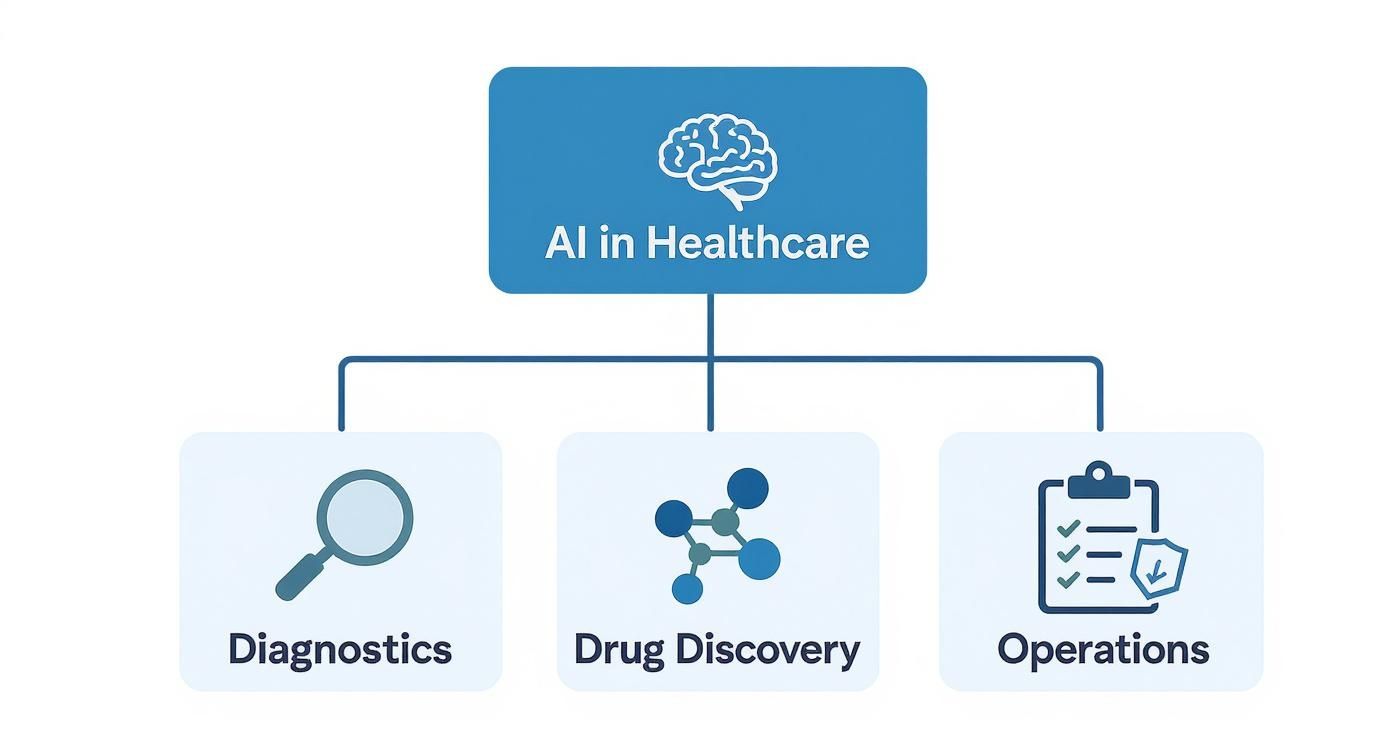
As you can see, AI in healthcare isn't a one-size-fits-all solution. It’s a toolkit of specialized instruments, each designed to solve a particular challenge along the healthcare journey. Getting this structure is the first real step toward building a smart adoption strategy.
For any organization ready to jump in, the starting point is always the same: identify your most pressing pain points. Are you trying to reduce diagnostic errors? Cut down on administrative waste? Whatever it is, there's likely an AI partner out there who can deliver real, measurable value.
You can learn more about these applications in our overview of AI for the healthcare industry. By understanding these distinct categories, you can navigate the landscape with confidence and find partners who will help you deliver better care and stay ahead of the curve.
How AI Is Sharpening Medical Diagnostics
What if a doctor had a superpower? An ability to spot diseases with near-perfect precision, catching them far earlier than humanly possible. That's not science fiction; it's the new reality that AI companies in healthcare are building right now in medical diagnostics. They're crafting sophisticated algorithms that pour over medical images and patient data, acting as a tireless second set of expert eyes for radiologists and pathologists.

These AI models learn by analyzing millions of images, teaching themselves to pick up on the faintest patterns that could signal the onset of cancer, diabetic retinopathy, or heart disease. It's a bit like how a child learns to recognize faces—after seeing thousands of examples, they can spot a friend in a crowd instantly. In the same way, a neural network learns the tell-tale signs of a malignant tumor in a CT scan, often with an accuracy that can match or even surpass a human expert.
Empowering Clinicians with Precision Tools
The top companies in this field aren't trying to replace doctors. Far from it. They're building tools that enhance a clinician's skills, helping them cut through overwhelming workloads and zero in on the most critical cases. For instance, an AI can quickly scan hundreds of mammograms and flag the handful that warrant immediate, detailed review by a specialist.
This partnership between human expertise and machine accuracy is where the magic happens. It drastically cuts down on the risk of human error caused by fatigue and makes the entire diagnostic workflow more efficient. The result? Faster, more reliable answers for patients who are anxiously waiting.
The goal of diagnostic AI isn't to create an "AI doctor." It's to give human doctors better tools to find anomalies, quantify risks, and make diagnoses with a higher degree of confidence, ultimately saving more lives.
Navigating the Path to Clinical Use
Getting these powerful diagnostic tools into a hospital isn't easy. This isn't your average software. These are medical devices that have a direct impact on patient health, and they must pass an incredibly rigorous validation process, including clearance from regulatory bodies like the FDA.
Companies have to prove their algorithms are not just accurate but also safe, dependable, and unbiased across diverse patient groups. This requires extensive clinical trials and a deep understanding of complex medical regulations. Successfully clearing these hurdles is what separates a promising idea from a market-ready leader in diagnostic AI.
These advancements are already making a tangible difference, representing a fundamental change in how we approach early disease detection. Just as the stethoscope amplified what a doctor could hear, AI is amplifying what they can see. For a practical example of how AI assists in the crucial task of document analysis during diagnosis, check out how our tool for extracting information from medical reports puts this principle into action.
Speeding Up Drug Discovery with AI
Getting a new drug from a lab idea to a patient's hands is an incredibly long and expensive journey. We're talking more than a decade and billions of dollars. But a new wave of AI companies in healthcare is starting to tear up that old playbook, using sophisticated AI to slash years off the research and development timeline.
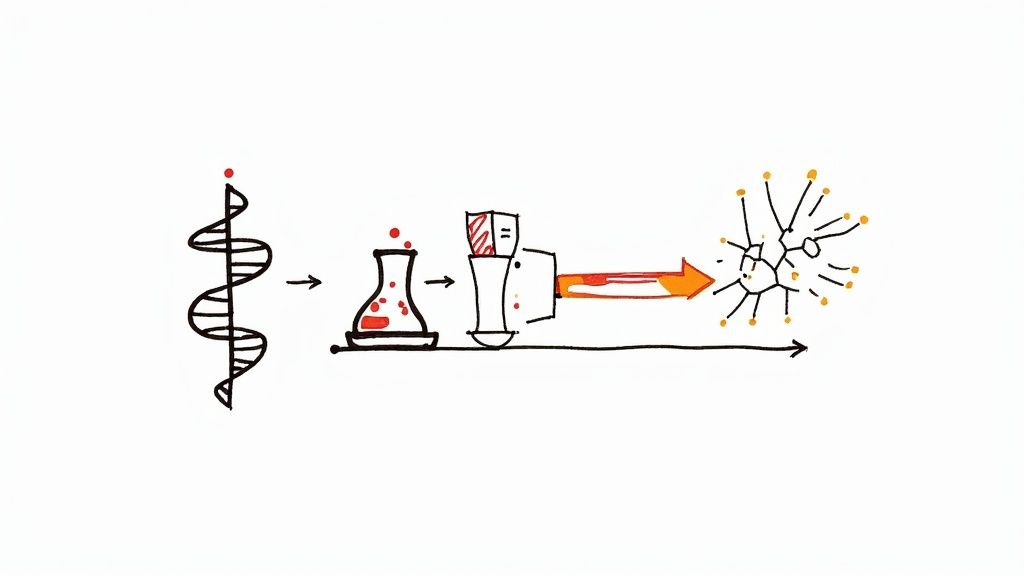
Think of it like this: traditional drug discovery is like trying to find one specific key for one specific lock by testing billions of random keys. It's a brute-force approach. AI models, on the other hand, can intelligently sort through massive biological and chemical databases to spot the most promising drug candidates and even predict how well they might work.
This is where you can really see the impact of modern AI tools for business, bringing incredible efficiency to the high-stakes world of pharmaceuticals.
Designing Drugs with Generative AI
One of the most mind-blowing advances is using generative AI to design completely new molecules that have never existed before. Companies are training algorithms to essentially "dream up" new chemical compounds that are tailor-made to hit a specific disease-causing protein.
This flips the old model completely on its head. Instead of just screening compounds we already have, scientists can now design the perfect key for a specific biological lock. The potential here is enormous, leading to treatments that could be far more effective and have fewer side effects. It’s a perfect example of what a well-defined AI Product Development Workflow can achieve.
The growth here is no surprise. The global AI in healthcare market is exploding, with North America currently holding the biggest piece of the pie at 49.29%. If you're curious, you can discover more insights about AI's growing role in healthcare.
Making Clinical Trials Smarter
Finding a promising drug is only half the battle. The next mountain to climb is proving it actually works in clinical trials. Here, too, AI is making a huge difference by making the process faster and more likely to succeed.
Predictive analytics platforms can now help researchers find the exact right patients for a trial. By crunching genetic, clinical, and even lifestyle data, AI can identify the subgroups of people most likely to benefit from a new drug.
This targeted approach does more than just speed things up; it also lowers the risk of a very expensive failure. Getting these specifics right is crucial for any successful strategy. The insights you gather can be solidified with a Custom AI Strategy report, which provides a clear roadmap for pushing pharmaceutical innovation forward.
Making Hospitals Run Smoother with AI
When we think of AI in healthcare, it's easy to picture futuristic diagnostics. But some of the most profound changes are happening behind the scenes, tackling the administrative chaos that can bring a hospital to a standstill. The smartest AI companies in healthcare know that a well-run hospital is a prerequisite for good patient care.
These companies are building tools to handle the relentless, repetitive tasks that drain time and energy from skilled staff. It's like giving your hospital an operational supercharger—one that never sleeps and is always looking for ways to optimize schedules, manage resources, and keep things moving. By automating these workflows, we hand precious time back to doctors and nurses, letting them focus on their patients. For more complex projects, you might even consider custom healthcare software development to create bespoke AI solutions for your specific needs.
Boosting Efficiency from Check-In to Check-Out
The real-world applications here are incredibly practical. We're seeing AI-powered scheduling that can predict no-shows and intelligently reshuffle appointments, keeping clinics busy and wait times down. Other tools analyze admission and discharge patterns to forecast bed demand, helping to prevent those dreaded logjams in the emergency room.
This is all about creating a smoother journey for everyone involved. For a closer look at how AI can manage patient communication and administrative duties right in the clinic, you can explore tools like the Clinic AI Assistant, which is built to solve these exact problems.
The real win with operational AI is giving clinicians their time back. When you remove the administrative grind, you let them work at the top of their game. That means better care for patients and a huge boost to team morale.
The Impact on Budgets and Burnout
The financial case is just as compelling. Take medical billing and coding—a notoriously complex and error-prone process. AI can scan claims for mistakes before they're ever sent, slashing the number of costly denials from insurance companies and getting payments in the door faster. That’s real money that can be reinvested into better equipment or new patient programs.
But it’s not just about the bottom line. A less chaotic, more efficient hospital is simply a better place to work. When you cut down on administrative friction, you directly combat staff burnout. Patients feel it, too, with shorter waits and a smoother experience. The entire system just works better.
Choosing the Right AI Healthcare Partner
Picking the right technology partner is a huge decision, one that can make or break your entire AI initiative. The market for AI companies in healthcare is exploding, and frankly, the number of vendors can be dizzying. This isn't just about buying a piece of software; it's about finding a strategic ally who can help you achieve real-world clinical and operational wins.
And the market is booming. We're looking at a projected $173.55 billion industry by 2029, all fueled by the relentless pressure to deliver better, more efficient patient care. To cut through the noise, you need a solid framework for evaluating potential partners. For a deeper dive, you can read the full analysis on AI's impact on healthcare statistics.
Foundational Evaluation Criteria
Before you even think about sitting through a product demo, you need to set your non-negotiables. A great partner won't just check these boxes—they'll have them locked down, ensuring your project is secure, compliant, and built to last.
Here are the absolute must-haves:
- HIPAA Compliance and Data Security: This is table stakes. If a vendor can't show you robust, audited security protocols for protecting patient data, the conversation is over.
- Clinical Validation and Evidence: Don't be swayed by a slick presentation. Ask for the proof—peer-reviewed studies, real-world case studies, and hard data that show their solution actually works.
- Scalability and Integration: The technology has to play nice with your current systems, especially your EMR. It also needs to grow with you, whether that means handling more data or rolling it out to other departments down the road.
To really get this right, it helps to look under the hood. A little background on the understanding the operations of AI companies can give you a major advantage when you're vetting potential vendors.
To help structure your evaluation, we've put together a practical checklist. Use this to guide your conversations and compare potential partners on a level playing field.
Vendor Evaluation Checklist for AI Healthcare Partners
A practical checklist to help healthcare organizations evaluate potential AI technology vendors across key domains.
| Evaluation Criteria | Key Questions to Ask | Red Flags to Watch For |
|---|---|---|
| Data Security & Compliance | Can you provide your HIPAA audit reports? How is patient data encrypted, both at rest and in transit? What is your breach notification process? | Vague answers on security protocols. Lack of third-party certifications (e.g., SOC 2, HITRUST). |
| Clinical Validation | Where are your peer-reviewed studies published? Can we speak with current clinical users? What were the specific outcomes in your case studies? | Claims based only on internal data. Inability to provide referenceable clients. Exaggerated ROI without proof. |
| Technical Integration | What EMRs do you have existing integrations with? What is the typical implementation timeline? What technical resources are required from our team? | "We can integrate with anything" without specifics. A one-size-fits-all approach. Underestimating the complexity of integration. |
| Model Transparency & Bias | On what datasets was your model trained? How do you monitor for and mitigate algorithmic bias? Can you explain how the model arrives at its conclusions? | "Black box" answers where they can't explain the logic. Unwillingness to discuss training data demographics. |
| Support & Partnership | What does your post-implementation support look like? Do you offer clinical workflow training? How do you handle feature requests and product updates? | Limited support hours. Support is outsourced or handled by a separate company. No clear product roadmap. |
This checklist is a starting point. Your own internal teams will surely have more specific questions to add, but this covers the universal fundamentals that every healthcare organization should be asking.
Strategic Alignment and Planning
A great partnership is about more than just technology—it's about shared goals and vision. This is why getting your strategy straight before you sign on the dotted line is so important. Working with a team on AI strategy consulting can be invaluable here.
A clear, well-documented AI Product Development Workflow is a great sign that a vendor knows what they're doing. It shows they have a repeatable process for getting things done, which drastically reduces your risk.
Tools like an AI requirements analysis can help you define exactly what you need, and a Custom AI Strategy report can provide a solid roadmap for your entire journey. With this kind of preparation, you can confidently find a partner who will help you succeed for years to come. The guidance from our expert team can make all the difference in this critical process.
Common Questions About AI in Healthcare
Diving into AI for healthcare brings up a lot of questions, especially when you're the one deciding where to invest precious time and money. It's totally normal to wonder about the real-world challenges, where this technology actually makes a difference, and how to tell one solution from another. Let's tackle some of the most common questions leaders have when considering a partnership with AI healthcare companies.
What Are the Biggest Challenges for AI Companies in Healthcare?
It's a tough field to break into, and for good reason. First off, getting regulatory approval from bodies like the FDA is a massive undertaking. It's a long, expensive journey that demands rock-solid clinical proof that your tool is safe and effective.
Then there’s data privacy, which is absolutely non-negotiable in healthcare. Companies have to be fanatical about complying with laws like HIPAA to protect sensitive patient information. You can't just move fast and break things here.
Another huge hurdle is getting access to the right data—and lots of it. To train an algorithm that's accurate and fair, you need massive, high-quality, and diverse datasets. Finally, even the best tool is useless if nobody uses it. A critical, and often underestimated, challenge is making sure new AI tools for business fit smoothly into how clinicians already work and, most importantly, earning their trust.
How Do I Know If My Practice Needs an AI Solution?
This is the big one. The need for AI isn't about chasing a trend; it starts with identifying real, persistent pain points in your practice.
Are your staff drowning in administrative work that leads to burnout? Are there bottlenecks in your patient flow? Could your clinicians use a second set of "eyes" to analyze complex diagnostic images more quickly and accurately? The best way to figure this out is to start with a thorough AI requirements analysis.
Working with an AI strategy consulting partner can help you connect your specific challenges to proven, real-world use cases. As we explored in our AI adoption guide, this process helps you see the potential return on investment and makes sure you're buying a solution to a problem you actually have.
What Is the Real Difference Between Diagnostic and Operational AI?
Great question. They both live under the "healthcare AI" roof, but they do very different jobs.
- AI for diagnostics is all about clinical support. Think of tools that analyze MRIs, CT scans, or lab results to help doctors spot, diagnose, and track diseases with better precision. It directly impacts patient care.
- AI for operations, on the other hand, focuses on the business of healthcare. This is the stuff that keeps the lights on: automating billing, optimizing schedules, and managing hospital beds or equipment to make everything run more smoothly. This also includes powerful internal tooling that streamlines workflows behind the scenes.
While diagnostic AI gets a lot of the spotlight for its clinical impact, operational AI is the unsung hero that cuts costs and reduces the administrative burden on your team.
How Can a Smaller Clinic Get Started with AI?
You don't need a massive budget to get started. For smaller clinics and practices, the trick is to think targeted and high-impact. Don't try to overhaul everything at once.
Pick one, well-defined problem and solve it. A fantastic starting point with a fast ROI is using AI Automation as a Service to handle those mind-numbing, repetitive administrative tasks.
Another smart move is to look for established AI tools that play nicely with the systems you already use. The key is to start small, prove the value, and then scale up. Working with our expert team to build a Custom AI Strategy report can give you a clear, budget-friendly plan for getting that first win.
Ready to define your healthcare AI strategy? Ekipa AI delivers tailored AI roadmaps in 24 hours, helping you uncover and execute transformation opportunities without the high cost of traditional consultants. Get started with our AI Strategy consulting tool.


